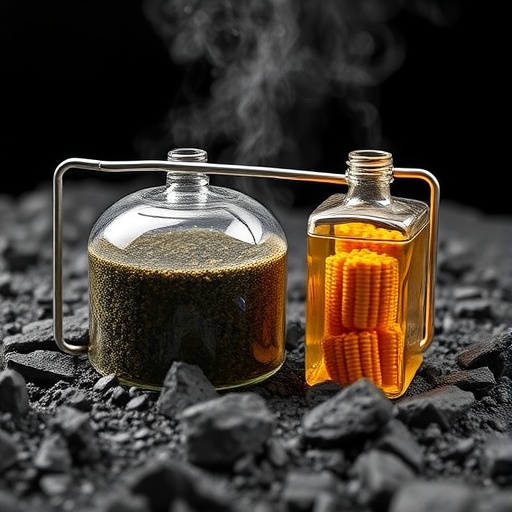In a groundbreaking approach to renewable energy production, researchers have investigated the co-fermentation of bituminous coal and corn straw as a method to generate hydrogen. This innovative process combines conventional fossil fuel sources with agricultural waste, showcasing the potential for a more sustainable future. Hydrogen, recognized as a clean energy carrier, is gaining traction as an alternative to fossil fuels. The focus of this research is to enhance hydrogen production efficiency while reducing the environmental footprint associated with energy generation.
The integration of coal and corn straw in a co-fermentation system represents an intriguing fusion of energy sources. Bituminous coal, known for its rich carbon content, serves as a carbon-rich substrate that is traditionally used in energy production. Conversely, corn straw, an abundant agricultural residue, is often underutilized and can present challenges in waste management. The coupling of these two materials not only aims to optimize hydrogen yield but also seeks to address issues related to biomass waste disposal.
The process of co-fermentation relies on microbial action to break down the complex organic matter present in both coal and straw. By utilizing specific microbial strains capable of fermenting lignocellulosic biomass, researchers aim to unlock the hydrogen contained in these materials. This biological process operates under controlled conditions where temperature, pH, and nutrient availability are meticulously monitored to enhance microbial activity and overall efficiency.
One of the critical aspects of this research is the comparative analysis of hydrogen production from coal-alone fermentation versus the co-fermentation approach. The findings indicate that the combination of coal and corn straw significantly increases hydrogen output, highlighting the synergetic effects of using diverse substrates. This is a notable advancement, as maximizing hydrogen production is essential to make this clean energy source viable for widespread adoption.
Moreover, the environmental implications of this study are substantial. Harnessing the energy potential of agricultural waste offers a double win: reducing methane emissions from decomposing straw and providing a sustainable pathway for energy production. This aligns with global efforts to reduce greenhouse gas emissions and transition towards renewable energy sources. By diverting agriculture by-products from landfills and integrating them into energy systems, the research contributes to a circular economy model.
The researchers employed advanced analytical methods to quantify the hydrogen produced during the fermentation process. Techniques such as gas chromatography and mass spectrometry allowed for precise measurement of gas outputs, reinforcing the scientific rigor behind their findings. Additionally, the study delves into the kinetics of hydrogen production, providing insights into the optimal conditions under which microbial fermentation occurs most efficiently.
Significantly, this research does not merely present theoretical frameworks but also lays the groundwork for practical applications in bioenergy facilities. The scalability of the co-fermentation approach is a crucial consideration, as large-scale implementation can lead to significant reductions in dependence on fossil fuels. Policy-makers and industry leaders are encouraged to explore and invest in such innovative technologies that promise to enhance energy security and promote environmental sustainability.
The researchers involved in this study have emphasized the importance of multidisciplinary collaboration in achieving these advancements. The synergy between microbiologists, environmental scientists, and engineers is essential in refining the fermentation process and developing effective bioreactor designs. This holistic approach can address challenges posed by substrate variability and optimize the technological pathways necessary for commercial hydrogen production.
In light of the global energy crisis and environmental challenges, the timing of this study is particularly relevant. Hydrogen production remains critically important for future energy landscapes, particularly in sectors that are difficult to electrify, such as heavy industry and transportation. The notion of utilizing locally sourced biomass waste offers a decentralized approach to energy production, potentially leading to enhanced energy resilience in communities.
As this research progresses into subsequent phases, continued investigations will likely explore the broader implications of co-fermentation in different regions and contexts. Local agricultural practices, biomass availability, and coal production methods will play significant roles in the adaptability and optimization of these processes around the world. Thus, the findings of this study have the potential to influence energy policy and agricultural practices globally.
Finally, the interdisciplinary nature of this research opens avenues for further exploration into other biomass materials and waste products that could complement the co-fermentation process. Future studies might explore the feasibility of integrating various agricultural residues or organic wastes, thus broadening the scope of sustainable hydrogen production methodologies.
By combining agriculture with conventional fossil fuels in a novel way, this research paves the path toward more sustainable energy solutions. The implications of co-fermentation extend beyond hydrogen production; they herald a new era where waste becomes a resource. As the world grapples with energy demands and climate change, pioneering studies like this one could forge a new path toward a cleaner and more sustainable energy future.
Subject of Research: Co-fermentation of Bituminous Coal and Corn Straw for Hydrogen Production
Article Title: Co-fermentation of Bituminous Coal and Corn Straw for Hydrogen Production
Article References:
Guo, X., Xu, X., Ma, L. et al. Co-fermentation of Bituminous Coal and Corn Straw for Hydrogen Production.
Waste Biomass Valor (2025). https://doi.org/10.1007/s12649-025-03412-y
Image Credits: AI Generated
DOI: https://doi.org/10.1007/s12649-025-03412-y
Keywords: Hydrogen Production, Co-fermentation, Bituminous Coal, Corn Straw, Renewable Energy, Microbial Fermentation, Biomass Waste, Environmental Sustainability, Circular Economy.
Tags: bituminous coal as energy substratechallenges in biomass waste managementco-fermentation of coal and corn strawdual fermentation for hydrogen productionhydrogen as a clean energy carrierinnovative approaches to hydrogen generationlignocellulosic biomass fermentationmicrobial fermentation for energy generationoptimizing hydrogen yield from biomassreducing environmental impact of energy productionrenewable energy from agricultural wastesustainable energy solutions





